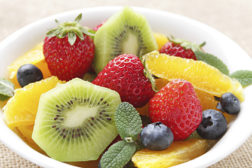Home » Keywords: » food trends
Items Tagged with 'food trends'
ARTICLES
Study: Rising generation of food consumers more open to new food technology
Gen Z respondents indicated they are more likely to try a food grown with technology (77%) and are more comfortable overall with the use of technology to grow food (71%).
November 5, 2019
Survey reveals U.S. consumers learn about healthy food trends via social media
Called the "Siri for brands," Suzy is a consumer intelligence platform that unlocks critical consumer insights to help organizations make better and more informed decisions—faster.
March 22, 2019
Study reveals nearly two-thirds of Americans are “food-connected” consumers
This segment of more food-aware, food-involved consumers now represents 62% of Americans across all demographics and geographies.
October 25, 2018
Experts predict pace of food, beverage innovation will quicken in 2018
A broad array of technological innovations will make it easier to acquire and consume foods and beverages tailored to today’s consumer’s specific food needs, speeds and philosophies.
January 4, 2018
Packaged Facts' food forecast: 10 food trends to watch in 2018
Here are the Top 10 food trends (listed in alphabetical order) projected for 2018.
November 16, 2017
Specialty Food Association predicts food trends for 2018
The Trendsetter Panel draws perspectives from retail, foodservice, strategic marketing and culinary education.
November 15, 2017
Study: 9 in 10 Canadians see no progress in food insecurity
According to the poll, 91% of Canadians think food insecurity is a persistent problem in Canada, a problem that 41% believe has worsened in the last decade.
June 19, 2017
Study: Sustainability will take center stage in 2017
Plant-based proteins will continue to increase in popularity, as will flexitarian and vegan options.
January 10, 2017
MSLGROUP: Food will bring us together in 2017
MSLGROUP’s annual food and beverage trends forecast highlights "connective force."
January 5, 2017
Elevate your expertise in refrigerated and frozen foods with unparalleled insights and connections.
Get the latest industry updates tailored your way.
JOIN TODAY!Copyright ©2024. All Rights Reserved BNP Media.
Design, CMS, Hosting & Web Development :: ePublishing





